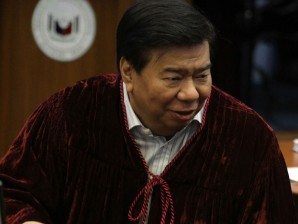MANILA, Philippines–Senators with varying positions on how much sin taxes should be raised appear headed for a showdown as the Senate begins debates on the controversial measure Tuesday afternoon.
In one corner rests Franklin Drilon, acting chair of the Senate ways and means committee, who is set to overhaul the committee report sponsored by resigned panel head Ralph Recto and work on raising sin taxes from tobacco and liquor to “at least” P24 billion.
Recto said he was prepared to question all figures and data that Drilon and other senators favoring higher sin taxes would propose during the debates.
Recto was widely criticized for submitting a report that proposed incremental increases of between P15 billion and P19 billion in sin taxes over a period of several years.
He, however, insisted that his numbers were “more realistic and responsible” because jacking up the taxes on sin products to what he perceived to be unreasonable levels would cause the collapse of the affected industries, and result in job losses and subsequently lower tax collections.
The senator remained wary of the Department of Finance’s revised endorsement of P40 billion in additional sin taxes, down from its original proposal of an additional P60-billion collection from tobacco and liquor.
Recto said he agreed not to withdraw his report to show Malacañang that he remained cooperative with the administration.
He resigned as ways and means chair three weeks ago after complaining that the DOF, the Department of Health and the Bureau of Internal Revenue refused to support his committee report.
The senator said he requested that his signature be removed from the committee report that Drilon plans to use during plenary debates.
“All the studies and efforts I made when I put the report together would go to waste if I do not defend my (original) position (although I admit) that my report has its flaws. That’s why I am prepared to submit my own amendments,” Recto said in an ambush interview.
“Having said that, I am no longer the chair, so, it is up to (Drilon) what he wants to do with my report. They can use [the report and] just take away my signature. I agreed to that because I was told the President wants this bill approved,” he added.
Recto insisted that he would not be an “obstacle” to the Senate debates on the sin tax measure.
The senator belied reports that the additional revenue from higher sin taxes had been factored in in the 2013 budget.
Recto said he learned this during a joint hearing of several Senate committees Monday morning.
In a separate huddle with reporters, Drilon said the Senate needed to approve a sin tax version that would raise the collection by a minimum of P24 billion because the 2013 budget of the DOH and the PhilHealth program for indigents was only P54 billion.
Drilon said the health sector would actually need P77.5 billion next year if it was to go ahead with its plan to enroll additional members from 5.2 million of the poorest Filipino families in the PhilHealth program.
Drilon said the minimum P24 billion would not yet include the 15-percent increment in the budget for safety nets to protect workers in the tobacco industry as provided by law.
“We need more revenue for our health sector. The health sector budget is P54 billion under the 2013 budget. They really need about P77.5 billion and therefore there is a funding gap of P23 billion to 24 billion,” Drilon said.
“That is why we have to pass the sin tax bill in order that we can fill the financial gap of this sector. We intend to pass the sin tax bill before the 2013 budget,” he added.
Drilon said approving a sin tax bill where the collection was lower than P24 billion would immediately frustrate the enrollment of more poor Filipinos in PhilHealth.
Some observers questioned Drilon’s plan to use the committee report submitted by Recto since he favored the DOF’s endorsement of higher sin taxes and reportedly, the sin tax bill filed by Sen. Miriam Santiago that targets P60 billion in additional revenue from tobacco and liquor products.
Drilon said he would use the committee report filed by Recto under the following premises:
* The need to increase the taxes
* The sin tax bill is a health measure “more than a finance or tax measure” because it declares that smoking is a major cause of mortality in the country
* Excise tax is an effective tool in reducing smoking in the country.
Recto, however, said the imposition of excise or uniform taxes on both local and foreign products would be disadvantageous to domestic business.
For example, imposing a uniform tax on local gin that costs less than P200 per liter and on imported gin that costs P1,000 per liter would make the local product more expensive and the foreign brand cheaper.
“I have already studied these issues. That’s why I have to defend these facts on the floor,” Recto said.
He said increasing taxes on local tobacco products would encourage cigarette smuggling, but other lawmakers countered that this would not happen because Philippine cigarettes would still be among the cheapest in the region should a higher sin tax rate be approved.
The Canada-based National Coalition Against Contraband Tobacco, meanwhile, wrote Sen. Ferdinand Marcos Jr. that higher cigarette taxes helped fund the activities of criminal gangs involved in smuggling in that country.
“While no two countries are exactly alike, we would like to take this opportunity … to share the Canadian experience with illicit tobacco in the hope that it will provide an international perspective for your domestic debate,” said NCACT spokesperson Gary Grant in a letter to Marcos.
The letter was given to Marcos while he and other senators attended the International Parliamentary Union in Quebec.
